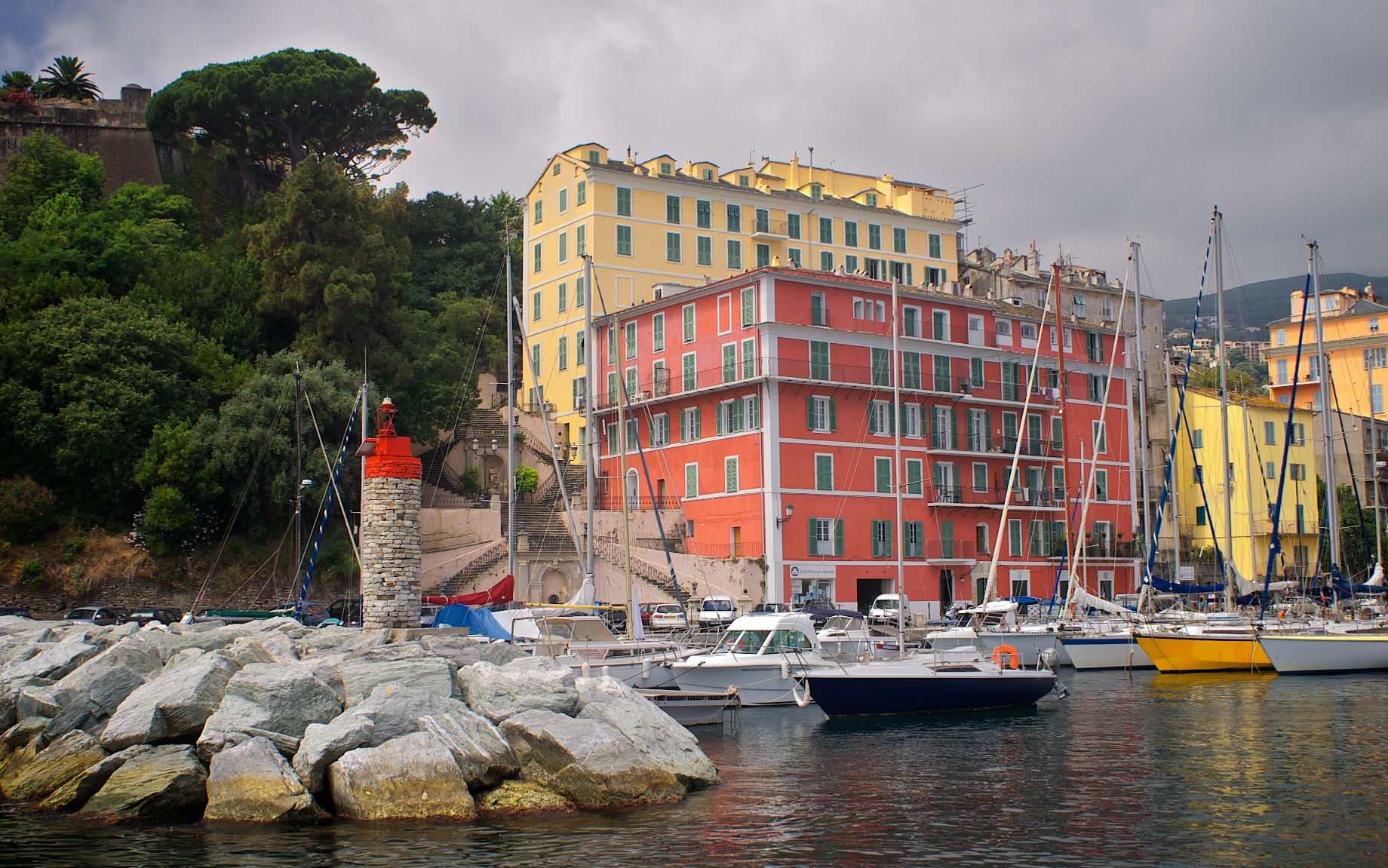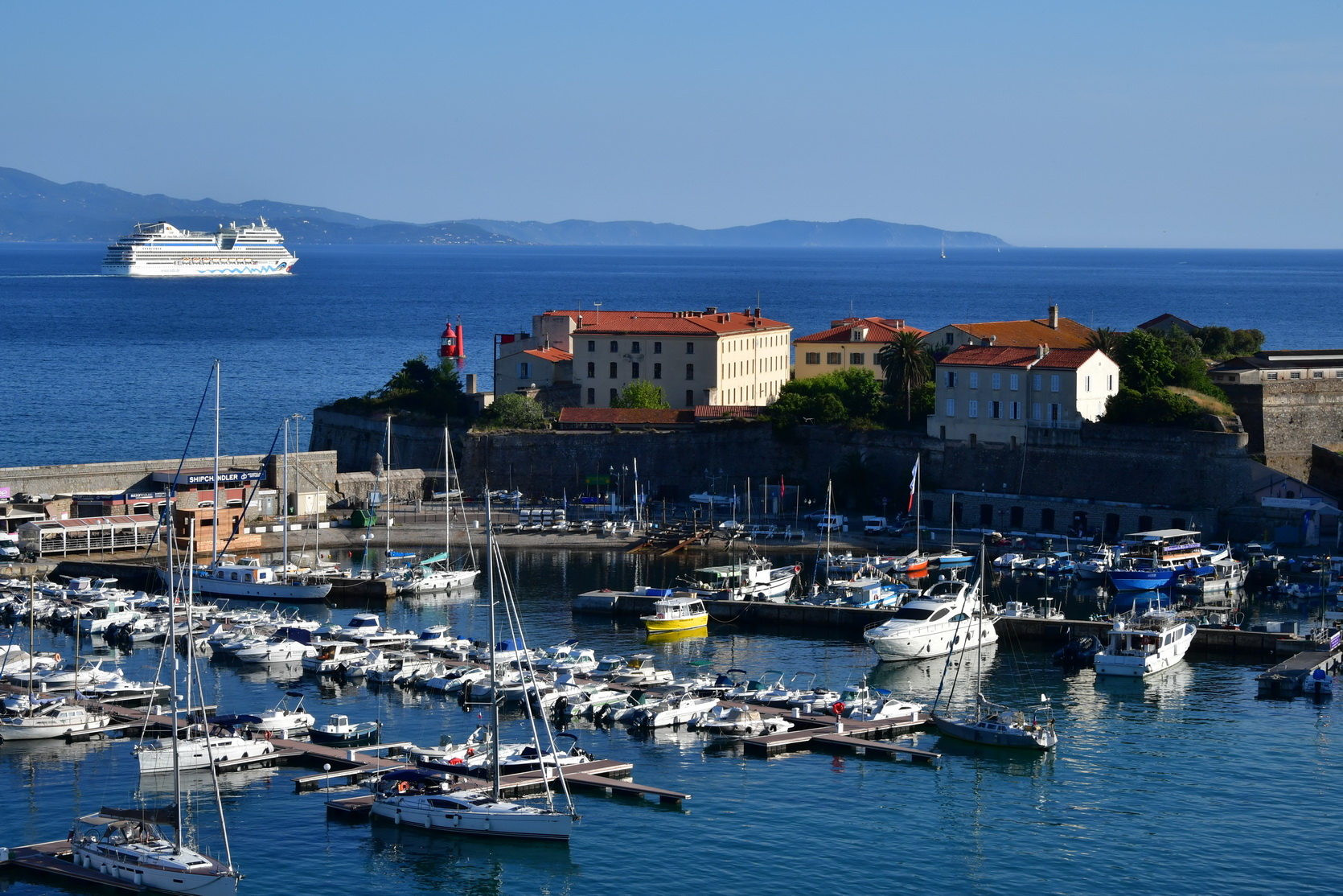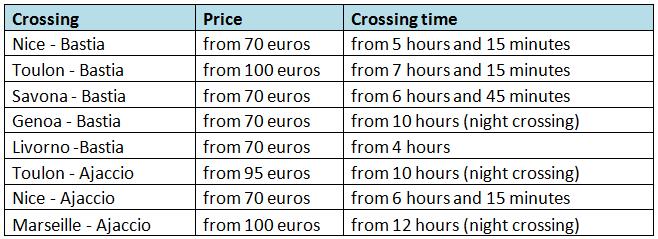- Contact usFR +33 450 872 109 US/CA +1 (646) 233-1354
- - Newsletter
- - Follow us





-

Home > Articles and tour tips > Getting to Corsica
05-03-2025
With beautiful beaches and majestic mountains, Corsica is the perfect setting for a bike tour. All you have to do is get there! In the following article, we will cover the different options you have for getting to (or departing from) this beautiful island.
Come and discover the beautiful island of Corsica. Though only 183km (114 miles) north to south and 83km (52 miles) east to west, don't let its small size fool you! The island boasts a wide variety of landscapes: from welcoming beaches to towering mountains.
Corsica has been inhabited since the 3rd millennium BCE and history shows that a wide variety of cultures have occupied the small island. From the Romans to the Greeks, French to the Genoese, Corsica is a fascinating combination of cultures. While French is the official language of the island, you may not recognize the local dialect, Corsu – a unique Italian dialect with strong Tuscan influences.
If you're yearning for long walks on the beach under the Mediterranean sun, then Corsica is the place for you! West Corsica gets more hours of sunshine than anywhere else in France. Average temperatures range from around 8 degrees Celsius in January to around 25 degrees Celsius in July and August (46-77 degrees Fahrenheit).
We offer 2 tours in Corsica; , A Short Corsican Escape , both starting from Bastia . So, now that you're curious about this beautiful Mediterranean island, how will you get there?

The city of Bastia dates from Roman times and while not especially large, is the perfect introduction to the Corsican way of life. Make sure to charge your cameras before walking through Place Saint-Nicolas ! The square faces the sea and is lined with shady trees and cafes, making it the perfect spot for a photo op and mid-afternoon snacks. Afterwards, head towards the Terra Nova, the old quarter, which is located immediately south of the square. Your visit won't be complete without a visit to the Vieux Port, with its picturesque marina filled with boats, surrounded by crumbling eighteenth-century buildings.
If you are flying to Bastia from within Europe, (depending on where you fly from) there is the possibility of flying directly into the Bastia Poretta Airport. Some airlines that fly into Bastia are HOP! and EasyJet . A full list can be found here . However, if you are flying from somewhere outside of Europe, you will need to fly into a larger international airport and connect to Bastia. Some of the international hubs that service Bastia are Paris CDG, London Heathrow, Madrid, Berlin, Nice, Lyon, and Geneva.
The airport in Bastia is located 22km (14 miles) away from the center of the city. Upon arrival on the island, the primary options for transport to Bastia include a shuttle service to the city center and taxis . The approximate price for the shuttle service is around 10 euros, while taxi service depends on the time of your arrival, but can vary from 45 and 60 euros.
If you choose not to fly, you will have to take a ferry to get to Bastia. Ferries to Bastia depart from the French ports in Toulon and Nice, and from Italy in Livorno, Savona, Piombino, and Genoa. Corsica Ferries offers up to 7 ferry crossings per day between the mainland and Bastia. A full list of their crossings can be found here .
Prices start from 28 euros per person (one-way/basic formula) and can go upwards of 110 euros per person (higher class of comfort). If you plan on bringing your bike with you on the ferry, please make sure to mention this when purchasing your ticket (in some cases additional charges may apply). The duration of your crossing will depend on your choice of port and time of departure. Crossings from Livorno take approximately 4 hours, while the crossing takes around 8 and a half hours from Toulon and 6 hours and 15 minutes from Nice. If booking a night crossing, the duration of your trip will be longer as you can relax and sleep during the voyage.
The port of Bastia is conveniently located in the center of town, just opposite the Place Saint Nicolas and the Tourist office. Once your ferry arrives, in order to get to your first destination, you can either walk (the town is easily accessible by foot), take one of the city's buses , or take a taxi . Bus tickets cost approximately 2 euros for a single fare, while taxi fares vary depending on your destination.
Regardless of the time of year, be sure to book ahead as fares can vary dramatically (depending on route, crossing time, class of comfort, and size of vehicle). Ferry companies that service the port of Bastia include Corsica Ferries , La Méridionale , and Moby Lines .

With pristine blue water and sandy beaches to welcome you, you're sure to quickly fall under Ajaccio 's spell. The city will enchant you with its pastel-colored buildings and its bustling cafes in the shade of historical statues. The old town is home to narrow streets lined with typical (and very picturesque) Mediterranean houses. The vibrant atmosphere of the town is charming and the plethora of cafes, bars, and restaurants make this city a relaxing haven for tourists.
Similar to Bastia, if you plan to fly into Ajaccio from within Europe, (depending on where you're flying from) there is the possibility of flying directly into the Ajaccio Napoleon Bonaparte Airport. Some airlines that fly into Ajaccio are HOP! and EasyJet . A full list of airlines can be found here. However, if you are arriving from outside of Europe, you will need to fly into a larger international airport and connect to Ajaccio. Some examples of international hubs that service Ajaccio are Paris ORY, Toulouse, Lyon, Milan, Rome, Geneva, and London Gatwick (May-October).
The airport in Ajaccio is located 7km (4 miles) away from the city center. The primary options for transport from the airport into town include a shuttle service to the train station in the center of town and taxis . Approximate prices for the shuttle service are around 10 euros per person, while the price of taxi service depends on the time of your arrival and range from around 20 euros.
Ajaccio's port is serviced by a number of ferry routes, with crossings from Nice, Toulon, and Marseilles available. Sailing times range from 6 hours and 15 minutes from Nice to 12 hours on the Marseille service. The port of Toulon offers ferry crossings to Ajaccio year-round.
The price of taking the ferries can range from 70 euros to 130 euros depending on the date and time of your passage.
Like the port of Bastia, make sure to plan ahead when reserving your passage, especially during the summer months. If you plan on bringing your bike with you on the ferry, please mention this when purchasing your ticket (in some cases additional charges may apply). The major companies that provide these links from France are Corsica Ferries , La Meridionale , and Corsica Linea .
If you choose to take a ferry to another port in Corsica (Porto Vecchio, Ile Rousse, Calvi, or Bonifacio), you won't arrive in Bastia or Ajaccio. Please feel free to check the following schedules for trains or buses in order to arrive in Bastia or Ajaccio.
Price Estimates – Ferries

Price Estimates – Airfare

Please note that these prices are to be used as a reference and may not necessarily reflect the current price.
You may choose to rent a car in Corsica for part of your journey. Dealers can be found at the Bastia-Poretta Airport (BIA), the Ajaccio Airport (AJA), the Sainte Catherine Airport (CLY), and in the towns of Calvi and Ajaccio. You can find the best deals by comparing rental companies online: Corsica Car Rental ( www.corsica-car-rental.com ), Avis France ( www.avis.com ), Europcar ( www.europcar.com ), Budget ( www.budget.com ), SIXT ( www.sixt.com ), Hertz France ( www.hertz.com ), and Enterprise France ( https://www.enterprise.com ). Note that drivers must be over 21 to rent a car (21-25 year olds may face extra fees) and they must possess a valid driver's license. (An international driver's license would help.)
Tourism:
Airports/airlines:
Ferries:
Car Rental:
For more information on our cycling tours, feel free to contact us or visit our website .
Traveling tips for Castilla and Leon
Gravel Bikes: The Perfect Companion for Exploring Europe’s Most Scenic Bike Tours
Is an e-bike the right choice for me?
Alsace (6)
Andalusia (7)
Annecy (3)
Apulia (4)
Avignon (2)
Brittany (3)
Catalonia (6)
Corsica (3)
Cycling tips (20)
Dolomites (3)
Emilia-Romagna (2)
Events (7)
France (35)
French Alps (12)
General (71)
Getting there (17)
Girona (1)
Ile-de-France (2)
Italy (17)
La Rioja (3)
Languedoc (4)
Loire Valley (5)
Madrid (2)
Normandy (7)
Our Bikes (7)
Piedmont (4)
Portugal (3)
Provence (11)
Pyrenees (3)
Sicily (2)
Spain (18)
Switzerland (8)
Travel tips (25)
Tuscany (3)
Uncategorized (0)
Veneto (6)